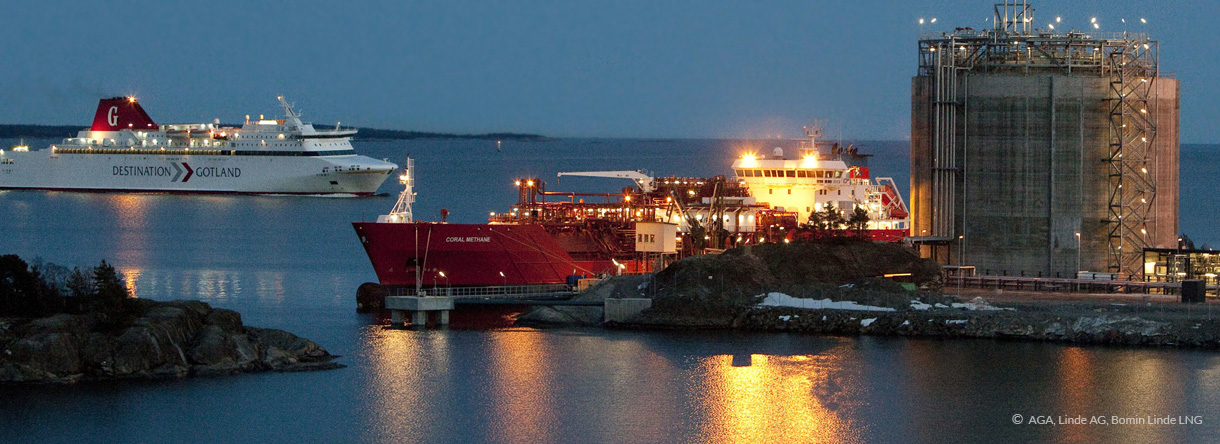“As one of the world’s major shipping nations, Germany needs an LNG infrastructure for its shipping industry to prepare for the upcoming energy transformation,” says Ralf Nagel, Chief Executive Officer of the German Shipowners’ Association (Verband Deutscher Reeder, VDR). “That’s why we welcome projects that quickly become reality, such as the terminal in Brunsbüttel,” says Nagel following a discussion with Rolf Brouwer, Managing Director of German LNG Terminal GmbH. Brouwer and Nagel exchanged views, discussing the status of the terminal project in Brunsbüttel and perspectives for shipping companies and the maritime industry.
Nagel emphasised that, from his point of view, LNG was currently the only marketable fuel available with which the maritime industry could approach its climate goals within the International Maritime Organization (IMO) as well as the objectives set for improving air quality. He said that it is important in the long term that LNG technology will also enable the large-scale use of alternative “green” gases on board ships in an environmentally-friendly way. “A ship’s engine running on oil-based fuels cannot be converted to “green gas” without great effort and expense – but a dual-fuel or LNG-capable engine can,” explained Nagel, before pointing out, “that’s why we should impartially discuss and carefully weigh up the use of liquefied natural gas to power large sea going vessels – and by all means develop the supply logistics for this at our location.”
“The LNG terminal in Brunsbüttel is an ambitious and forward-looking infrastructure project because natural gas and therefore LNG play an important role in the energy transformation. The shipping industry is also facing the particular challenge of significantly reducing the emission of pollutants. The planned terminal in Brunsbüttel will be a practical support for introducing more sustainable alternative fuels, especially for shipping traffic.” That was how Rolf Brouwer summarised the discussion. The technology also enables the handling of synthetically-produced and therefore environmentally-friendly LNG. “Our project team brings a wealth of relevant experience to German LNG Terminal, enabling us to optimally implement the project from start to finish.”
The plan is to work with two special jetties. The one jetty will handle Q-Max tankers ranging between 120 m and approx. 345 m in length and with a capacity of approx. 265,000m³ LNG, while the other jetty will handle smaller LNG tankers, such as bunker vessels, ranging from 70 m to 170 m.
The terminal will have a maximum unloading rate of 14,000 m³/h which means that large ships can be unloaded in approx. 20 hours. Safety checks, paper work, tug assistance etc. must also be taken into account. Smaller LNG tankers will have correspondingly shorter layovers.
German LNG and the shareholding companies – Wealth of experience
German LNG Terminal GmbH is a joint venture between Dutch companies Gasunie LNG Holding B.V. and Vopak LNG Holding B.V. as well as Oiltanking GmbH, a subsidiary of Marquard & Bahls AG, based in Hamburg, Germany. The aim of the joint venture is to build and operate a multifunctional import and distribution terminal for liquefied natural gas (LNG) in Brunsbüttel. The terminal will also provide a wide range of services including the loading and unloading of LNG carriers, the temporary storage of LNG, regasification, feeding natural gas into the German natural gas network, and distribution of LNG via tank trucks and LNG tank cars.
German LNG Terminal opted for the location at Brunsbüttel because of its proximity to the port of Hamburg and the many manufacturing companies based in the region. Along with this attractive business environment, the Kiel Canal also runs close to the planned terminal, which provides easy access to the Scandinavian and Baltic countries.
The German Shipowners’ Association
The German Shipowners' Association (Verband Deutscher Reeder, VDR) is responsible for representing the common business and social policy interests of German shipping companies at federal and state government level as well as in relation to European and international bodies. The VDR was established in 1907, and in 1994 it merged with the Association of German Coastal Shipowners. With a membership of around 200, the VDR represents the majority of Germany’s merchant fleet. Further particulars are available at www.reederverband.de.
Contacts:
Katja FreitagSpokespersonGerman LNG Terminal GmbHTel. +49 30 20642-975 / Mobile +49 152 21700511Katja.freitag@GermanLng.com
Dr. Frank Laurich
Laurich & Kollegen
phone: + 49 (0)40 75 25 77 - 990
frank.laurich@laurich-kollegen.de
Christian Denso
Head of Communications
VDR - Verband Deutscher Reeder
phone: +49 40 350 97 238 / Mobile: +49 162 20 22 005
denso@reederverband.de
